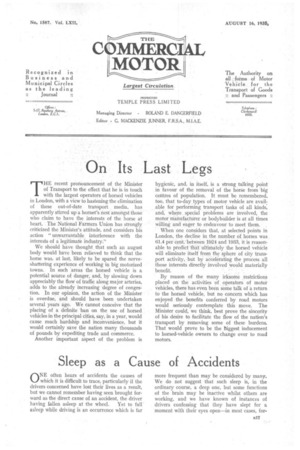On Its Last Legs
Page 27

If you've noticed an error in this article please click here to report it so we can fix it.
THE recent pronouncement of the Minister of Transport to the effect that he is in touch with the largest operators of horsed vehicles in London, with a view to hastening the elimination of these out-of-date transport media, has apparently stirred up a hornet's nest amongst those who claim to have the interests of the horse at heart. The National Farmers Union has strongly criticized the Minister's attitude, and considers his action "unwarrantable interference with the interests of a legitimate industry."
We should have thought that such an august body would have• been relieved to think that the horse was, at last, likely to be spared the nerveshattering experience of working in big motorized towns. In such 'areas the horsed vehicle is a potential source of danger, and, by slowing down appreciably the flow of traffic along major arteries, adds to the already increasing degree of congestion. In our opinion, the action of the Minister is overdue, and should have been undertaken several years ago. We cannot conceive that the placing of a definite ban on the use of horsed vehicles in the principal cities, say, in a year, would cause much hardship and inconvenience, but it would certainly save the nation many thousands of pounds by expediting trade and commerce.
Another important aspect of the problem is hygienic, and, in itself, is a strong talking point in favour of the removal of the hot-Se from 'big centres of population. It must be remembered, too, that to-day types of motor vehicle are available for performing transport tasks of all kinds, and, where special problems are involved, the motor nianufacturer or bodybuilder is at all times willing and eager to endeavour to meet them. , When one considers that, at selected points in London, the decline in the number of horses was 91.4 per centbetween 1924 and 1933, it is reasonable to pi-edict that ultimately the horsed vehicle will eliminate itself from the sphere of city transport activity, but by accelerating the process all those interests directly involved would materially benefit. .
By reason of the many irksome restrictions placed on the activities of operators of motor vehicles, there has even been some talk of a return to the horsed vehicle, but no concern which has enjoyed the benefits conferred by road motors would seriously contemplate this move. The Minister could, we think, best prove the sincerity of his desire to facilitate the flow of the nation's transport by removing some of these burdens. That would prove to be the biggest inducement to horsed-vehicle owners to change over to road motors.




















































































